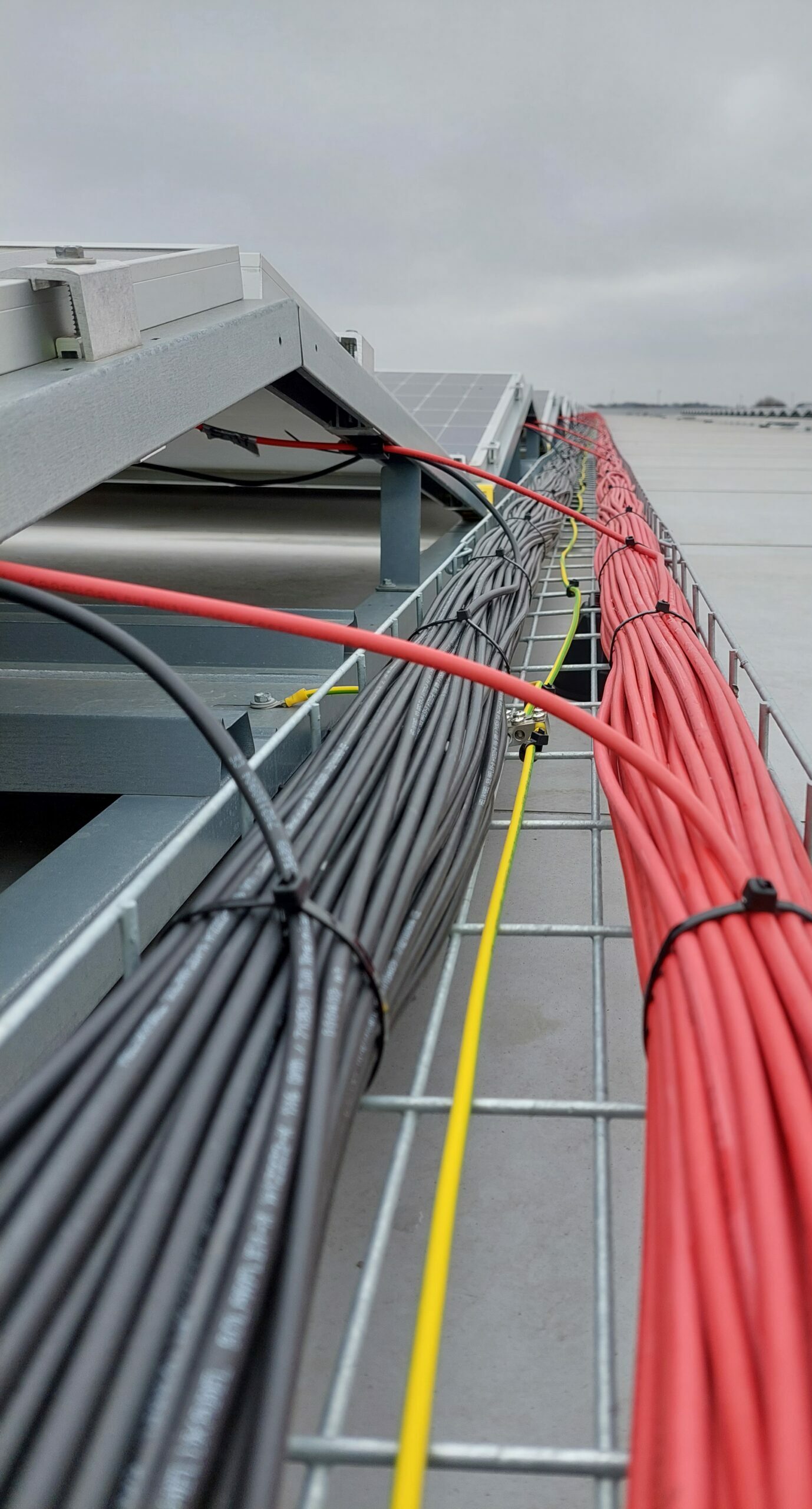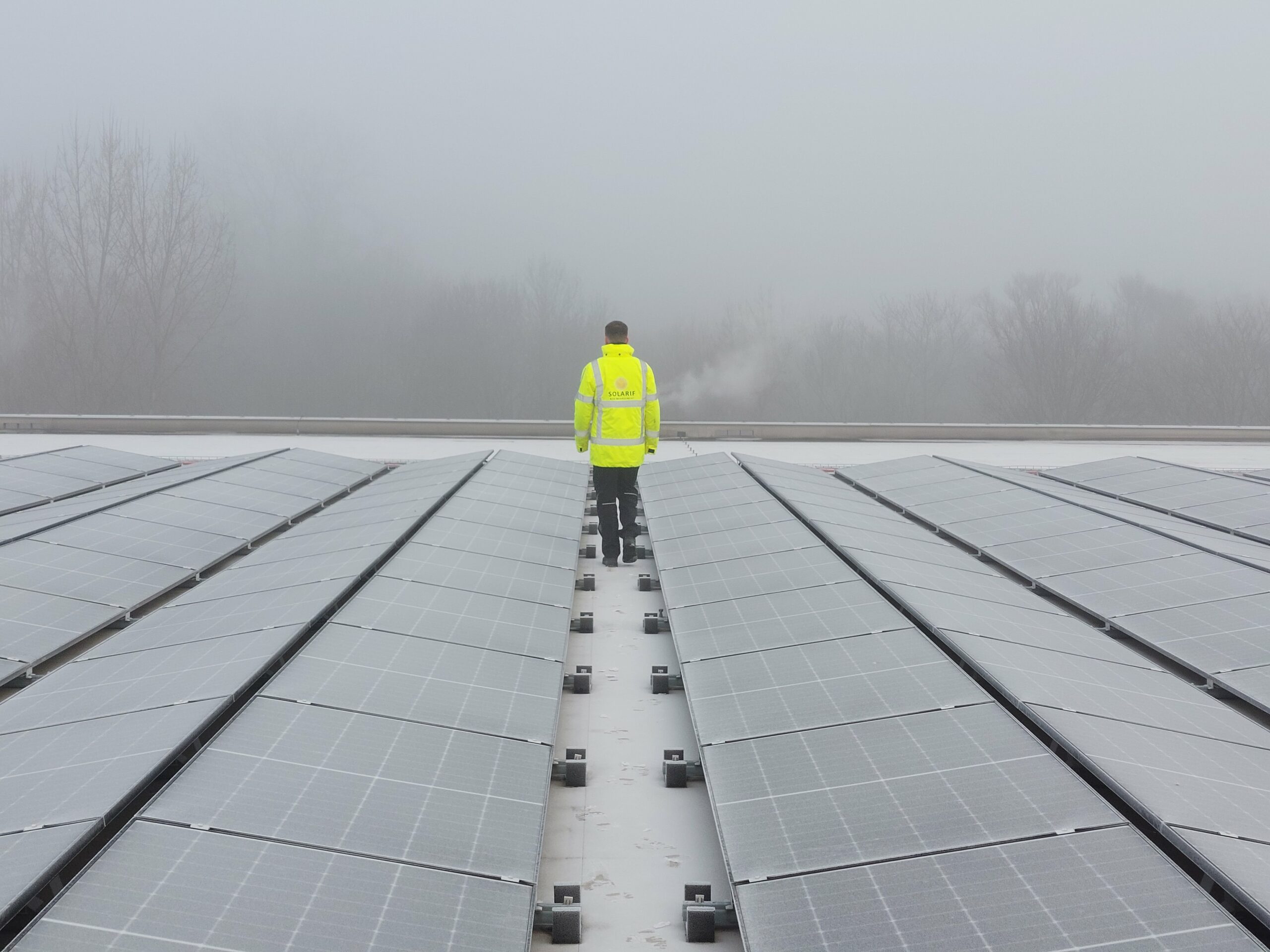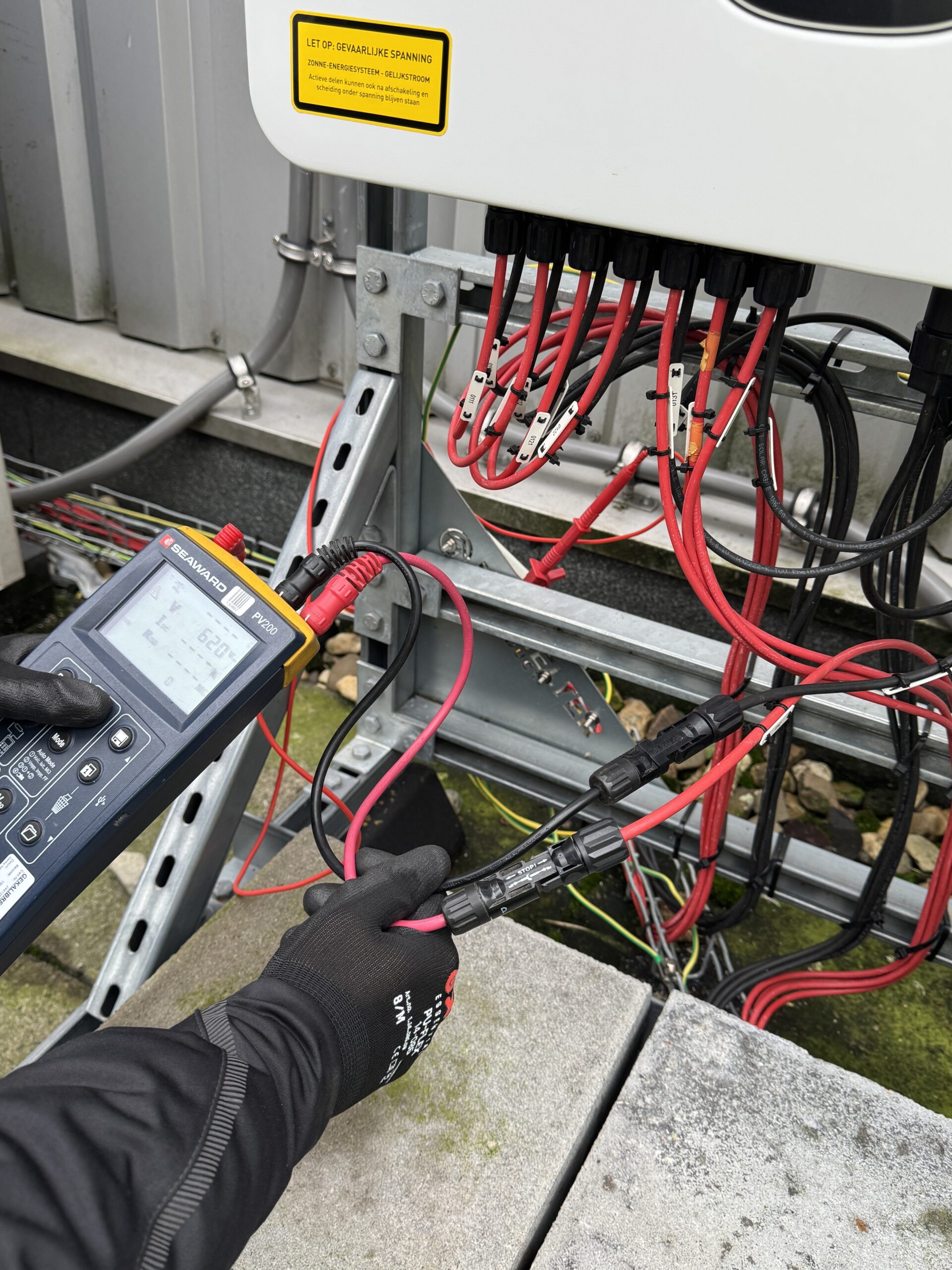Welke defecten leiden er vaak toe dat zonne-installaties niet voldoen aan scope 12-inspectie?
Zonne-installaties die niet voldoen aan Scope 12-inspecties vertonen meestal een aantal veelvoorkomende gebreken die de veiligheid, prestaties en verzekerbaarheid in gevaar kunnen brengen. Deze problemen variëren van problemen met de elektrische bedrading en structurele montagefouten tot incompatibiliteit van onderdelen en hiaten in de documentatie. Hoewel Scope 12-inspecties niet wettelijk verplicht zijn als je alleen zonnepanelen hebt, zijn ze wel verplicht als je commerciële zonne-installaties in Nederland wilt verzekeren. Verzekeraars kiezen ervoor om systemen die niet aan de veiligheidsnormen voldoen niet te verzekeren, waardoor deze inspecties essentieel zijn voordat dekking wordt verleend tegen standaardtarieven. Inzicht in de meest voorkomende gebreken kan projectontwikkelaars, EPC's en eigenaren van onroerend goed helpen om hun systemen goed voor te bereiden en kostbare herkeuringen te voorkomen.

Wat is een Scope 12-inspectie voor zonne-installaties?
Een Scope 12 inspectie is een uitgebreid evaluatieprotocol dat speciaal is ontwikkeld voor de Nederlandse markt en uitsluitend voor zon-PV-installaties om de elektrische veiligheid, de kwaliteit van de installatie en de naleving van de industrienormen te beoordelen. Deze inspecties worden uitgevoerd door gecertificeerde SCIOS Scope 12 inspecteurs en controleren of fotovoltaïsche systemen correct en veilig zijn geïnstalleerd volgens de geldende voorschriften en de richtlijnen van de fabrikant.
Tijdens een Scope 12 inspectie onderzoeken inspecteurs tal van aspecten van de installatie, waaronder elektrische aansluitingen, montagestructuren, de kwaliteit van componenten en systeemdocumentatie. Ze controleren of de elektrische veiligheidsvoorschriften zoals NEN 1010, NEN 3140, NEN-EN-IEC 62446-1, NEN-EN-IEC 61439 en SCIOS Technical Document 18 worden nageleefd.
Je kan meer informatie over het volledige Scope 12 inspectieproces en de vereisten voor uw zonneprojecten.
Welke elektrische defecten mislukken vaak bij Scope 12-inspecties?
Elektrische defecten behoren tot de meest voorkomende en ernstige problemen die mislukkingen bij Scope 12 inspecties veroorzaken. Onjuiste bedradingsverbindingen staan bovenaan de lijst, met name losse verbindingen die kunnen leiden tot vonken, oververhitting en mogelijk brandgevaar. Inspecteurs stellen deze problemen vaak vast tijdens visuele en warmtebeeldbeoordelingen.
Inadequate aardingssystemen vormen een ander kritisch storingspunt. Slechte aarding kan de veiligheid in gevaar brengen bij blikseminslag of storingen, waardoor installaties kwetsbaar worden voor elektrische pieken en schokgevaren kunnen veroorzaken. Ook onjuiste zekeringen en overstroombeveiligingen die niet voldoen aan de systeemspecificaties kunnen leiden tot onmiddellijke storingen.
Niet-conforme MC4-connectoren of verkeerd passende connectortypes zijn ook veel voorkomende elektrische defecten. Het gebruik van connectoren van verschillende fabrikanten kan leiden tot slechte verbindingen, terwijl het niet goed weerbestendig maken van elektrische componenten vaak resulteert in het binnendringen van water en mogelijke kortsluiting.
Andere elektrische problemen zijn onder andere:
- Onjuiste stringconfiguratie die niet overeenkomt met de specificaties van de omvormer
- Onvoldoende dimensionering van geleiders waardoor spanning daalt en oververhitting kan optreden
- Ontbrekende of onjuiste DC-isolatoren en AC-uitschakelingen
- Slecht verlegde kabels onderhevig aan fysieke schade of UV-degradatie

Welke invloed hebben montage- en constructiekwesties op de inspectieresultaten van Scope 12?
Gebreken in de montage en constructie zijn vaak de oorzaak van mislukkingen bij Scope 12 inspecties, omdat ze zowel de integriteit van het systeem als de veiligheid van het gebouw in gevaar kunnen brengen. Inadequate dakbevestigingspunten of onjuiste bevestigingsmethoden zijn vaak geïdentificeerde problemen, vooral wanneer installateurs de richtlijnen van de fabrikant voor de installatie van montagesystemen niet volgen.
Bij daksystemen met ballast vinden inspecteurs vaak onjuiste ballastberekeningen of onvoldoende ballastgewicht, waardoor het systeem niet is beveiligd tegen windbelasting. Hierdoor ontstaat het risico op verschuiving van panelen of zelfs volledige uitval van het systeem tijdens slechte weersomstandigheden.
Structurele problemen die tijdens de inspecties zijn geïdentificeerd, zijn onder andere
- Ontbrekende of onvolledige structurele belastingsberekeningen die aantonen dat het dak het gewicht van het PV-systeem plus sneeuw- en wateraccumulatie veilig kan dragen.
- Onjuiste afstand tussen montagerails veroorzaakt spanning op het paneel
- Onjuiste kantelhoeken die niet overeenkomen met de ontwerpspecificaties
- Binnendringingen door dakbedekkingsmaterialen die niet goed weerbestendig zijn
- Onvoldoende uitzettingsruimte in montagesystemen om thermische beweging op te vangen
Het is belangrijk op te merken dat Scope 12 inspecteurs weliswaar zelf geen constructieberekeningen uitvoeren, maar wel controleren of deze kritieke veiligheidsaspecten goed zijn overwogen en gedocumenteerd door gekwalificeerde ingenieurs.

Waarom veroorzaken componentselectie en compatibiliteitsproblemen inspectiefouten?
Problemen met de selectie en compatibiliteit van componenten zijn verantwoordelijk voor een aanzienlijk deel van de mislukkingen bij Scope 12 inspecties. Niet op elkaar afgestemde systeemcomponenten die niet zijn ontworpen om samen te werken, kunnen ernstige operationele en veiligheidsproblemen veroorzaken. Bijvoorbeeld, het gebruik van omvormers die niet geschikt zijn voor de aangesloten paneelcapaciteit of het mengen van verschillende paneeltypes binnen dezelfde string kan leiden tot systeeminefficiëntie en mogelijke storingen.
Inspecteurs stellen vaak het gebruik vast van niet-gecertificeerde apparatuur zonder de juiste veiligheidscertificaten of kwaliteitsnormen. Hieronder vallen panelen, omvormers of systeemcomponenten die niet voldoen aan de Europese normen of die niet voorzien zijn van de juiste CE-markering.
Andere defecten met betrekking tot onderdelen zijn onder andere:
- Apparatuur geïnstalleerd in ongeschikte omgevingen (bijv. omvormers zonder de juiste IP-classificatie voor hun installatielocatie)
- Gebruik van onderdelen die niet geschikt zijn voor de plaatselijke klimaatomstandigheden
- Onjuiste dimensionering van omvormers ten opzichte van de array-capaciteit
- Ontbrekende of ontoereikende overspanningsbeveiliging
- Onderdelen geïnstalleerd in strijd met de specificaties van de fabrikant
Deze problemen hebben niet alleen invloed op de prestaties van het systeem, maar vormen ook veiligheidsrisico's die installaties onverzekerbaar maken als ze niet worden verholpen.
Welke tekortkomingen in documentatie en naleving leiden tot mislukte inspecties?
Gebreken in de documentatie en in de naleving zijn enkele van de meest vermijdbare maar voorkomende oorzaken van mislukte Scope 12-inspecties. Door ontbrekende of onvolledige systeemdocumentatie kunnen inspecteurs niet controleren of installaties aan de vereiste normen voldoen. Essentiële ontbrekende documenten zijn vaak elektrische schema's, datasheets van componenten en testrapporten van de inbedrijfstelling.
Inspecteurs stellen regelmatig ontbrekende of ontoereikende as-built tekeningen vast die het geïnstalleerde systeem niet nauwkeurig weergeven. Ook ontbrekende of onvolledige constructieberekeningen voor op het dak gemonteerde systemen zijn vaak aangehaalde tekortkomingen.
Veel voorkomende documentatie- en nalevingsproblemen zijn onder andere:
- Onvoldoende etikettering van elektrische componenten, uitschakelingen en waarschuwingsborden
- Ontbrekende noodstopprocedures
- Onvolledige of afwezige bedienings- en onderhoudshandleidingen
- Niet-naleving van specifieke elektrische normen (NEN 1010, NEN 3140, NEN-EN-IEC 62446-1, NEN-EN-IEC 61439, etc.)
- Gebrek aan goede testrapporten voor de inbedrijfstelling, inclusief isolatieweerstandstests en controle van de aardverbinding
Hoe kunnen defecten aan een zonne-installatie worden voorkomen vóór een Scope 12 inspectie?
Het voorkomen van defecten in zonne-installaties vereist een proactieve aanpak gedurende de gehele projectlevenscyclus. De meest effectieve preventieve maatregel is werken met gekwalificeerde installateurs die specifieke ervaring hebben met commerciële zonne-installaties en de Scope 12-vereisten begrijpen.
Het implementeren van uitgebreide kwaliteitscontroleprocessen tijdens de installatie helpt bij het identificeren en aanpakken van problemen voordat ze uitgroeien tot inspectiefouten. Dit omvat regelmatige controles aan de hand van ontwerpspecificaties en richtlijnen van de fabrikant, evenals tussentijdse tests van elektrische systemen tijdens de installatie.
Effectieve preventieve maatregelen zijn onder andere:
- Pre-inspectiebeoordelingen uitvoeren aan de hand van dezelfde criteria als officiële Scope 12-inspecties
- Ervoor zorgen dat volledige documentatie is voorbereid en georganiseerd vóór inspectie
- Alleen compatibele, gecertificeerde onderdelen van gerenommeerde fabrikanten gebruiken
- Volg nauwkeurig de installatie-instructies van de fabrikant
- Regelmatige kwaliteitscontroles uitvoeren tijdens de installatie in plaats van pas na voltooiing
- Vroegtijdig contact met verzekeringsmaatschappijen om specifieke vereisten te begrijpen
Door potentiële defecten proactief aan te pakken, kunnen projecteigenaren dure herinspecties en vertragingen bij het verkrijgen van verzekeringsdekking voorkomen.

Wat zijn de belangrijkste aandachtspunten om Scope 12 inspecties tot een succes te maken?
De meest kritische factor voor het slagen voor Scope 12 inspecties is aandacht voor detail tijdens het gehele installatieproces. Installaties van hoge kwaliteit beginnen met een goede planning, waarbij ervoor wordt gezorgd dat het systeemontwerp voldoet aan alle relevante normen en dat alle componenten compatibel en gecertificeerd zijn.
Volledige en nauwkeurige documentatie is essentieel. Dit omvat niet alleen technische specificaties en elektrische schema's, maar ook constructieberekeningen, testresultaten van de inbedrijfstelling en bedieningshandleidingen. Als deze documentatie georganiseerd en beschikbaar is voor inspecteurs, verbetert dat de inspectieresultaten aanzienlijk.
Vergeet niet dat Scope 12 inspecties niet wettelijk verplicht zijn voor het hebben van zonnepanelen, maar wel als je commerciële zonne-installaties wilt verzekeren. Verzekeraars bieden geen dekking voor systemen die niet door deze inspectie zijn gekomen, of bieden mogelijk alleen dekking tegen hogere premies met beperkende voorwaarden. In bepaalde hoogwaardige commerciële gebouwen waar bedrijfsonderbreking aanzienlijke financiële verliezen kan veroorzaken, kunnen verzekeraars vaker Scope 12-inspecties eisen dan de standaard vijfjaarlijkse interval.
Door samen te werken met ervaren professionals die zowel de technische vereisten als de verzekeringsnormen begrijpen, kunnen we ervoor zorgen dat systemen vanaf het begin correct worden ontworpen, geïnstalleerd en gedocumenteerd. Deze aanpak vergroot niet alleen de kans dat het systeem door de inspectie komt, maar resulteert ook in beter presterende, veiligere zonne-installaties met lagere onderhoudskosten op de lange termijn.
Neem vandaag nog contact met ons op!
Laat onze gecertificeerde SCIOS Scope 12 experts uw systeem inspecteren en uw investering veiligstellen. Blijf compliant, verzekerbaar en zorgeloos. We geven u graag inzicht in het efficiënt inspecteren van uw zonne-installatie. Neem vandaag nog contact met ons op voor meer informatie en een offerte!
E-mail: support@solarif.com
☎️ Telefoon: +31 (0)26 711 5050




